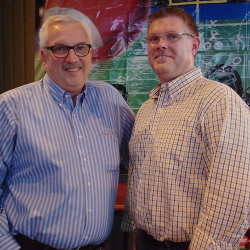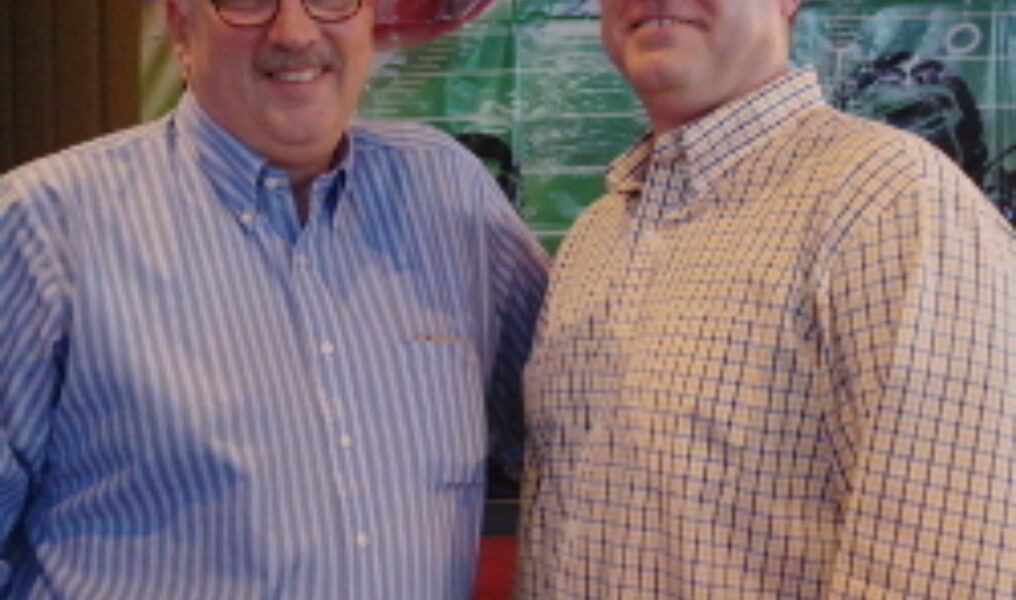 Ford Motor Company GLOBE board chairman Bill Peters and former chairman Greg Stone. Peters joined Ford Motor Company two and a half years ago and works as a senior IT project manager in the application development project management office, he assumed the role of chairman earlier this year. Stone joined Ford in 1995 and served as chairman of Ford Globe for five years and still serves on the board.
Ford Motor Company GLOBE board chairman Bill Peters and former chairman Greg Stone. Peters joined Ford Motor Company two and a half years ago and works as a senior IT project manager in the application development project management office, he assumed the role of chairman earlier this year. Stone joined Ford in 1995 and served as chairman of Ford Globe for five years and still serves on the board.
DEARBORN – Ford Globe, the company's LGBT employee resource group, was founded in 1994 but called itself the "Ford Family" back then. The name was changed a year later to Ford Gay, Lesbian or Bisexual Employees — or GLOBE — and they adopted a mission, vision and objectives statement and designed an official logo. The group now has roughly 300 members across the world, with about 170 members in the United States.
Since 2004 Ford Motor Company has received a 100 percent on the Human Rights Campaign's Corporate Equality Index — a measurement of how equitably large private businesses in the U.S. treat their LGBT employees, consumers and investors — and continues to remain a leader in LGBT corporate equality.
In June of 2000, Ford, Chrysler and General Motors were some of the first companies to adopt health care benefits for same-sex domestic partners of salaried and hourly employees. Implementation of the change took effect in August, and in September of 2000 two pilot training classes on sexual orientation in the workplace were held at Ford manufacturing plants.
Along with its participation in Motor City Pride, this year Ford Globe participated in Kentuckiana Pride, the Chicago Pride Parade, Cologne Pride in Germany and Brighton Pride in the United Kingdom.
BTL sat down with current chairman of the board Bill Peters and former chairman of the board Dr. Greg Stone. Peters joined Ford Motor Company roughly two years ago and works as a senior IT project manager in the application development project management office. Peters comes from a multi-generational Ford Family and lives with his partner of 15 years, Reggie.
Stone is director of occupational health and safety at Ford. Stone joined Ford in April of 1995 as manager of Health, Safety and Security in Ford in Australia. Stone was chairman of Ford Globe for five years and still serves as a board member.
How did GLOBE form and who was involved?
Stone: The two founders were Alice McKeage and Rob Matras. They were the two people who had the meeting in the living room and really did all of the work. There were a few core founding people. Way back there was an ally outreach coordinator called Bob Burrell. Bob's partner, Tony, still works in engineering here. Bob really was the first one to do the ally outreach to the plants and so on, and he was very courageous because 10-15 years ago that was even a less friendly place than it is now, and Bob was an ally employee who faced a lot of challenges in doing that.
How has GLOBE changed since you joined?
Stone: It was originally formed because they needed to advocate for the company to change the policies and do the benefits and that sort of stuff, so there was as lot of advocacy and so on. And a couple of things happened: the policies and things were OK and then of course we went through a downturn, too, so a lot of things became 'nice to do.' We are really in the process of trying to rebuild our membership.
Why did you decide to join GLOBE?
Peters: Long story for me but I've known about GLOBE since inception. I've only been working for Ford Motor Company for 2.5 years now. I knew about it because they have a public facing website and they were in the news a lot for many of the things that they did early on for the company by being out there and getting the (domestic partner) benefits and making people aware. I was an agency contractor employee for a year and joined just shortly after the middle of that time.
What has been the most challenging part of assuming the role as chairman?
Peters: 1. Understanding the full impact that GLOBE has beyond what my narrow vision was — I knew what it means based on our objectives — but GLOBE has a much farther reach within and outside Ford. And 2. Understanding that and being able to consume that and absorb that within the position; being able to make sure that I'm not overstepping, too.
How is the role of GLOBE going to change now that we have marriage equality? What is the future of domestic partner benefits at Ford?
Peters: That's interesting that you ask that. There are companies out there that aren't sure if domestic partner benefits can stay domestic partner benefits — you're just dropping the same-sex in front of it, because they are a domestic partner. You can be in a same-sex or an opposite sex relationship and need domestic partner benefits. But if you choose to get married then you would go under the policies of being a married couple. So, I think that's going to be a challenge that not only Ford has but any company that has offered domestic partner benefits — to assess if that is something that that company wants to maintain by dropping the same-sex in front of domestic and keep domestic partner or say, 'Now that marriage equality is here, you get married or you don't.' It's new for everyone.
What does the future of GLOBE look like?
Peters: Going forward, it's about helping to promote an inclusive environment within work and within opportunities in the company. There isn't a single policy that we need to change. We can all with our husbands, wives or partners still get our benefits and discounts — it's all there. I don't think there's anything policy wise that we need to advocate for. I go back to the HRC CEI index. A lot of that is on there and it explains a lot of that. The sought-after employers have the policies in place. I think our biggest challenge moving forward is helping the company understand what inclusiveness is. I think the company understands that. It is just how do companies do that.










